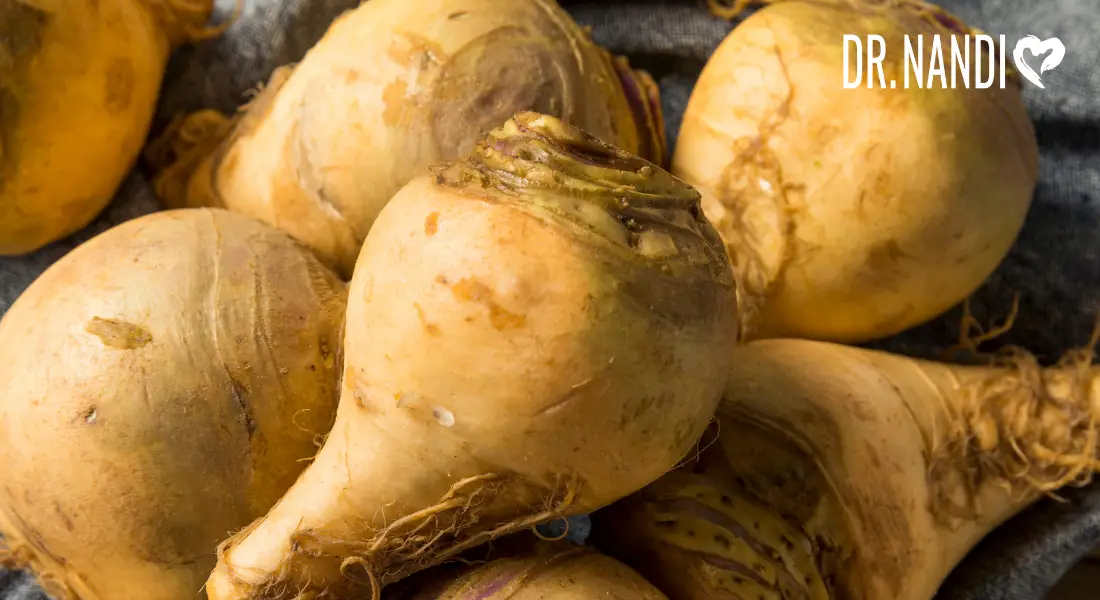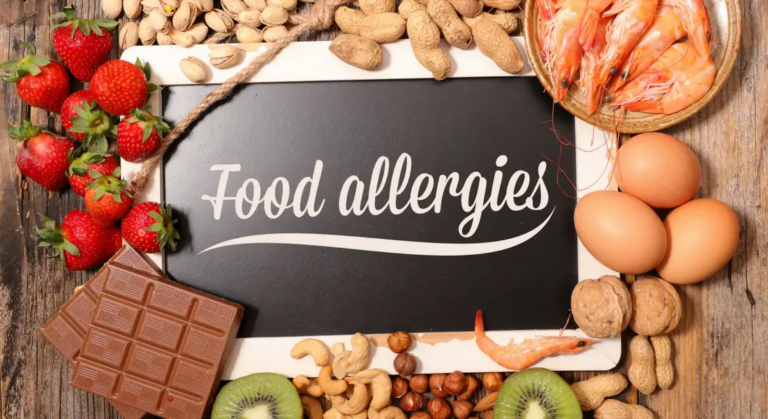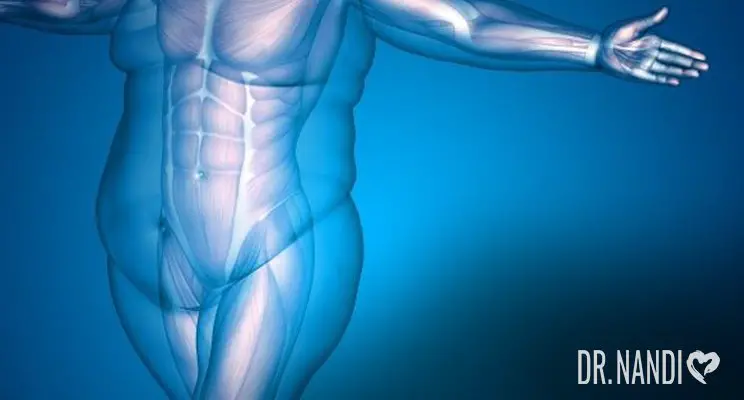The Rutabaga plant is a cross between cabbage and turnips that originated in Russia. They are grown throughout North America and the world. Another name for the rutabaga is the yellow turnip. Rutabagas are a cool-weather crop and are usually planted in the spring. They take about three months to mature and are ready to harvest in late summer or early fall. The roots can be stored through the winter and will keep for several months if they are kept in a cool, dark place.
Rutabagas are a good source of vitamins C and E, potassium, and fiber. They can be eaten raw or cooked and are often used in soups and stews.
Moreover, here are some nutrition facts and health benefits of Rutabaga:
Rutabaga Nutrition Facts
Rutabaga is a low-calorie root vegetable that is an excellent source of fiber, vitamins, and minerals. Here are the nutritional facts for one cup (140 grams) of raw rutabaga:
- 52 calories
- 0.2 grams of fat
- 1.5 grams of protein
- 12 grams of carbohydrates
- 3.2 grams of fiber
- 60 milligrams of calcium
- 427 milligrams of potassium
- 35 milligrams of vitamins C
Additionally, Rutabaga is a good source of thiamin, riboflavin, niacin, vitamin B6, folate, magnesium, phosphorus, and copper.
Health Benefits of Rutabaga
Here are some of the amazing health benefits of Rutabagas.
Rutabaga is High in Fiber
Rutabagas are high in dietary fiber, like complete fiber which is known to aid in digestion and protect against disease. People who eat enough fiber have a lower risk of colon cancer, Type 2 diabetes, and constipation. One cup of rutabaga contains nearly 20% of women and 14% of men of the recommended dietary fiber per day.
Rutabaga Lowers Blood Pressure
Rutabagas contain potassium which can help lower blood pressure by reducing the stress and contractions of blood vessels. Potassium is a vasodilator, which allows for easier passage of blood while increasing the oxygenation to vital organs and throughout the system. It lowers the chance of clotting. Potassium can also help lower cholesterol levels, reducing the risk of strokes, atherosclerosis, and heart attacks. Magnesium essentials help to lower blood pressure.

Rutabaga Helps Improve Digestion
Rutabagas are a good source of dietary fiber, which is necessary for proper digestion. Fiber helps to bulk up stools and move them through the digestive system more easily. This can help reduce the symptoms of constipation, diarrhea, and other digestive disorders improving digestion health.
Rutabaga Supports Heart Health
Rutabagas contain vitamins C and E, which are antioxidants that help to protect the body against damage from free radicals. Free radicals are unstable molecules that can cause cell damage and lead to chronic diseases such as cancer and heart disease. Antioxidants help to neutralize free radicals and prevent them from causing harm.
Vitamin C is also necessary for the production of collagen, a protein that helps to keep the skin and blood vessels healthy. Vitamin E is known to help lower cholesterol levels and support heart health.

Rutabaga Has Anti-Cancer Properties
The rutabaga contains antioxidants and has a rare sulfur-containing compound called glucosinolates. These are known to reduce the growth of cancerous tumors in the body. Rutabagas also contain high levels of carotenoids and vitamin C, which act as antioxidants that battle the effects of free radicals. They help to prevent healthy cells from mutating into cancerous ones.
Rutabaga Helps Manage Diabetes
Rutabagas are a low-glycemic food, which means they don’t cause spikes in blood sugar levels. This is important for people with diabetes because it helps to keep blood sugar levels under control. Rutabagas are also high in fiber, which helps to regulate digestion and slow the absorption of sugar into the bloodstream.
Rutabaga Promotes Brain Health
Rutabagas are a good source of choline, a nutrient that is essential for brain health. Choline is necessary for the development of the brain and nervous system. It also helps to protect the brain from age-related damage and improve cognitive function.
Pregnant women need adequate levels of choline to prevent birth defects, and it is also important for healthy fetal development. Choline deficiency has been linked to mental disorders such as depression, bipolar disorder, and schizophrenia.
Rutabagas are also a good source of folate, a nutrient that is important for pregnant women. Folate helps to prevent birth defects of the brain and spine. Adequate levels of folate are also important for proper cell development and DNA synthesis.
Rutabaga Helps Boost Immune System
One serving of rutabaga contains more than half the recommended daily allowance of vitamin C. Vitamin C stimulates the immune system, which helps fight off illness and infections. Vitamin C also plays an essential part in collagen production, contributing to the development and healing of skin tissue, muscle, and blood vessels. Or if you like then you can try immune health supplements too.
Rutabaga Can Prevent Premature Aging
Eating a diet high in antioxidants can help prevent premature aging. Many signs of aging can be moderated through the environment and your diet, as well as by reducing inflammation-promoting activities, such as smoking and sun exposure.
Vitamin C is a potent antioxidant found in rutabagas that helps neutralize free radicals in your skin caused by pollution and damage from ultraviolet (UV) light. It also plays a key role in the synthesis of collagen, an important protein that keeps your skin strong. UV exposure can damage collagen, and vitamin C plays a role in both creating collagen and protecting it.
Antioxidants known as glucosinolates may also play a protective role in skin aging.
Rutabaga Promotes Bone Health
Rutabagas are rich in several essential minerals for creating and maintaining bone tissues, such as calcium, magnesium, phosphorus, and zinc. Consuming rutabaga may help lower your risk of common age-related disorders such as osteoporosis.
Frequently Asked Questions
Does Rutabaga have a month?
September is Rutabaga Month.
How long does it take Rutabaga to mature?
It takes roughly 80 to 100 days for rutabaga to grow from seed.
Are rutabagas safe for pregnant women to eat?
Root vegetables such as rutabagas are great for pregnant women. Still, pregnant women are cautioned while consuming root vegetables due to the risk of contracting toxoplasmosis. Toxoplasmosis is an infection caused by the parasite Toxoplasma gondii, which is present in contaminated soil. You can double-check with your primary care provider.
Discover different ways how you can include Rutabaga in your daily diet. Get a FREE copy of my Superfood Cookbook.

References:
- Storage of fresh-cut swede and turnip in modified atmosphere: effects on vitamin C, sugars, glucosinolates and sensory attributes – ScienceDirect
- Rutabaga, raw nutrition facts and analysis. (nutritionvalue.org)
- Effect of cooking on the contents of glucosinolates and their degradation products in selected Brassica vegetables – PubAg (usda.gov)
- Storage of fresh-cut swede and turnip in modified atmosphere: effects on vitamin C, sugars, glucosinolates and sensory attributes – ScienceDirect
- Vitamin C revisited – PubMed (nih.gov)
- A history of vitamin E – PubMed (nih.gov)
- Cruciferous and Allium Vegetable Intakes are Inversely Associated With 15-Year Atherosclerotic Vascular Disease Deaths in Older Adult Women – PubMed (nih.gov)
- Cruciferous vegetables intake and the risk of colorectal cancer: a meta-analysis of observational studies – PubMed (nih.gov)
- Cruciferous vegetables intake and risk of prostate cancer: a meta-analysis – PubMed (nih.gov)
- Total phenolics and antioxidant capacity of indigenous vegetables in the southeast United States: Alabama Collaboration for Cardiovascular Equality Project – PubMed (nih.gov)



















